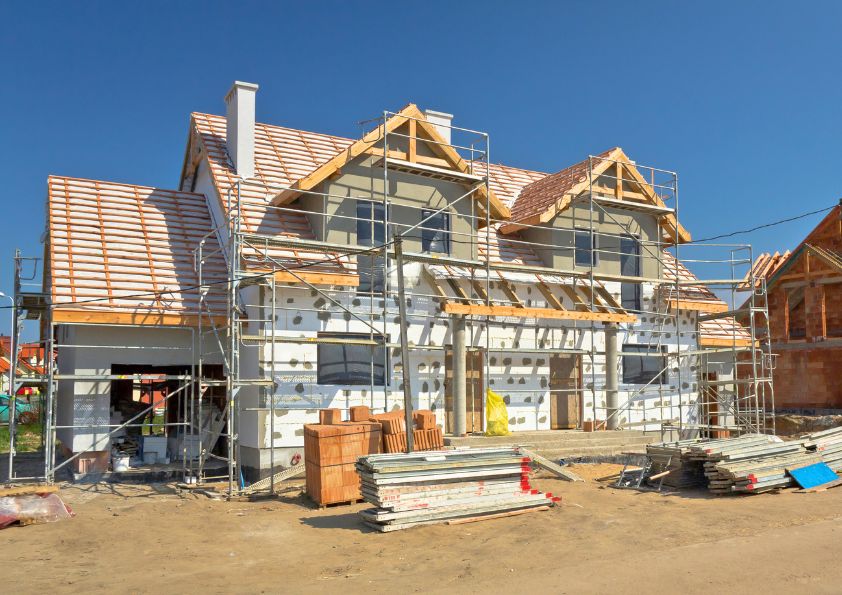Our Blog
Recent:

Decoding the Myth: Will a Silver Tsunami Impact the 2024 Housing Market?
The term "Silver Tsunami" has been circulating online, causing speculation about its potential impact on the 2024 housing market. This colloquialism refers to aging Americans adjusting their housing arrangements as baby boomers grow older. The concept suggests a significant wave of downsizing, leading to an influx of larger homes on the market. However, experts argue that the Silver Tsunami may not be as imminent as some predict.
Understanding the Silver Tsunami:
HousingWire defines the Silver Tsunami as a phenomenon where aging Americans change their housing arrangements to accommodate their needs. The idea revolves around the baby boomer generation downsizing their homes, potentially causing a surge in the number of larger homes for sale. While the concept seems plausible in theory, experts believe it won't have a substantial impact on the housing market in 2024.
Why 2024 May Remain Unaffected:
Contrary to the Silver Tsunami theory, experts assert that this transformative potential has not materialized in any significant way and is unlikely to do so in the near future. Data from the AARP reveals that over half of surveyed adults aged 65 and above plan to age in place rather than move. This reluctance to relocate is a key factor in why the expected wave of housing market changes has yet to occur.Data from the AARP shows over half of the surveyed adults ages 65 and up plan to stay put and age in place in their current home rather than move (see chart below):

Experts Weigh In:
According to Mark Fleming, Chief Economist at First American, demographic trends do not manifest as tsunamis but rather as gradual shifts. The baby boomer generation spans almost two decades of births, indicating that any impact on the housing market will unfold slowly over time. Fleming emphasizes that these demographic trends are more likely to trickle than create a sudden surge.
The Gradual Nature of Demographic Trends:
In debunking the Silver Tsunami myth, it becomes evident that not every baby boomer is planning to sell or move. Those who do decide to relocate are likely to do so gradually over an extended period. Mark Fleming's insight into demographic trends highlights that the impact of any housing market adjustments resulting from baby boomers will be a slow, steady process rather than an abrupt event.
Conclusion:
If concerns about a Silver Tsunami disrupting the 2024 housing market have crossed your mind, rest assured that the evidence suggests otherwise. The reluctance of many baby boomers to move, coupled with the gradual nature of demographic trends, indicates that any impact on the housing market will be a slow and manageable evolution. As Mark Fleming aptly puts it, "Demographic trends, they don't tsunami. They trickle."
1-31-2024

The Power of Pre-Approval in Your Homebuying Journey
Embarking on the journey of purchasing a new home is an exciting venture, but it comes with a myriad of considerations. Among these, one crucial step stands out as a game-changer: pre-approval. Before you delve into envisioning your life in a new living space, or picturing yourself enjoying meals on a potential all-season patio, it's essential to team up with a trusted lender and prioritize this pivotal phase of the homebuying process. Here's why pre-approval should be at the top of your checklist.
Despite moderating home price growth and a recent decline in mortgage rates, the real estate market's affordability remains tight. The current scarcity of homes for sale intensifies the competition among prospective buyers. However, by approaching the situation strategically, you can navigate these challenges, and pre-approval emerges as the key player in this scenario.
Understanding the Significance of Pre-Approval
To comprehend why pre-approval holds such significance, it's essential to grasp the concept. In the homebuying process, a lender assesses your financial situation to determine the amount they are willing to lend you. The outcome is a pre-approval letter, detailing the maximum loan amount you can borrow. Freddie Mac explains this as an indication from the lender that they are willing to extend a specified amount to facilitate your future home purchase. It's important to note that the pre-approval letter indicates the lender's maximum offer, and borrowers should only commit to an amount they are comfortable repaying.
Beyond the pre-approval letter, the process prompts you to adopt a broader financial perspective, helping you understand what you can realistically afford. This strategic approach prevents potential heartaches down the road by ensuring you don't fall in love with a home that might be financially out of reach.
The Competitive Edge of Pre-Approval
However, the advantages of pre-approval extend beyond personal financial clarity. In a market where demand surpasses the available homes for sale, competition among buyers is fierce. Being pre-approved for a mortgage elevates your position in the eyes of sellers.
In today's dynamic housing market, possessing a pre-approval becomes your secret weapon. It signifies to sellers that you are a committed and serious buyer, providing a significant advantage in a landscape where multiple offers are commonplace. As noted in a Wall Street Journal article, "If you plan to use a mortgage for your home purchase, preapproval should be among the first steps in your search process. Not only can getting preapproved help you zero in on the right price range, but it can give you a leg up on other buyers, too."
Pre-approval communicates to sellers that you are more than a casual observer – you are a buyer who has undergone thorough credit and financial scrutiny. This significantly increases the likelihood of a smooth transaction without unexpected delays or complications. Sellers appreciate the reliability of a pre-approved offer, creating a mutually beneficial scenario.
In Conclusion
Before you dive into daydreams of furnishing your dream home, collaborate with a reputable lender to secure your pre-approval. This proactive step not only saves you time and stress but also shields you from potential obstacles along the way. The reality is, the more prepared you are, the greater your chances of securing the home you've been yearning for. Pre-approval is not just a step in the process; it's the key that unlocks doors in your homebuying journey.
1-29-2024

The Impact of Lower Mortgage Rates on Housing Inventory
Introduction:
The recent decline in mortgage rates not only spells good news for prospective homebuyers in terms of affordability but may also signal a positive shift in the real estate market. The lowering of mortgage rates appears to be encouraging more homeowners to reconsider selling their properties, a trend that could potentially provide an increased inventory for those looking to buy.
The Mortgage Rate Lock-In Effect:
Over the past year, the housing market has faced a shortage of available homes, a phenomenon attributed to the rate lock-in effect. As mortgage rates rose, many homeowners opted to postpone selling their homes, choosing to retain their lower mortgage rates instead of moving and taking on higher rates for a new property. This trend limited the options available to potential buyers in the market.
A Shift in Seller Behavior:
Recent data from Realtor.com indicates a noteworthy change in the market. In December 2023, there was an increase in new listings compared to the same period in the previous year. See graph below:

Traditionally, the housing market experiences a slowdown in activity towards the end of the year, with sellers often delaying their listings until the beginning of the next year. This recent surge in new listings during the typical lull period suggests a potential easing of the rate lock-in effect due to the decline in mortgage rates.
Implications for Homebuyers:
While this shift may not lead to an immediate abundance of housing options, it does suggest a positive trend. The Joint Center for Housing Studies (JCHS) notes that
"a reduction in interest rates could mitigate the rate lock-in effect, providing homeowners with a renewed incentive to sell. As interest rates continue to decline, the barrier to moving decreases, potentially prompting more homeowners to list their properties. This, in turn, offers homebuyers a broader selection of homes to consider."
Conclusion:
The downward trend in mortgage rates appears to be having a positive impact on the housing market by encouraging more homeowners to list their properties for sale. As a prospective homebuyer, this may translate to an increase in housing options and opportunities to find the ideal home. To stay informed about the latest listings and market developments in your area, it's advisable to connect with a local real estate expert who can guide you through the evolving landscape of the real estate market.
1-26-2024

Navigating the 2024 Real Estate Market: 3 Essential Steps When Selling Your Home
If selling your house is on your agenda for 2024, you're likely filled with a mix of excitement for the future and sentimentality for your current home. To ensure a smooth and successful sale, consider these three crucial steps that can help you make informed decisions and achieve the best outcome.
Price Your Home Right.
In the ever-evolving landscape of real estate, understanding the current market conditions is paramount. With the shift in the housing market observed in 2023, characterized by rising mortgage rates and normalized home price appreciation, pricing your home accurately is more critical than ever. According to Hannah Jones, an Economic Research Analyst for Realtor.com, sellers should collaborate closely with local agents to set an attractive listing price. Striking the right balance is essential, as overpricing may deter buyers, while underpricing might mean leaving money on the table. Rely on the expertise of a seasoned real estate agent to determine the optimal asking price, ensuring your property attracts significant demand and fetches top dollar.
Keep Your Emotions in Check.
With homeowners staying in their homes for more extended periods, emotional attachment to the property has become more prevalent. The longer you reside in a place, the more memories and sentimental value it accumulates. This emotional connection can cloud judgment when it comes to pricing. To navigate this, enlist the assistance of a real estate professional who can provide objective guidance during negotiations and help you establish a fair pricing strategy. Trusting experts who prioritize your best interests is key in maintaining a level-headed approach throughout the selling process.
Stage Your Home Properly:
While your personal decor choices may have made your house a home, not every potential buyer will share the same taste. Creating a universally appealing first impression is crucial to attract a broad range of buyers. Focus on depersonalizing your space, allowing prospective buyers to envision themselves living in the home. Jessica Lautz, Deputy Chief Economist and Vice President of Research at the National Association of Realtors, emphasizes the importance of home staging, stating that it is a way to showcase the property in its best light. Collaborate with a real estate professional to get expert advice on preparing your home for sale and making it universally appealing.
Conclusion:
If selling your house is in your plans for 2024, connecting with a real estate professional can provide valuable insights and assistance in navigating the process. By adhering to these essential steps—pricing your home right, keeping emotions in check, and staging your home properly—you can enhance your chances of a successful and satisfying home-selling experience.
1-22-2024

Unveiling the Dynamics: 3 Decisive Elements Shaping Home Affordability
In the ongoing discourse surrounding housing affordability, the spotlight often gravitates toward the ebb and flow of mortgage rates. While the recent descent in rates brings a breath of relief, grasping the true essence of home affordability necessitates a comprehensive examination of three pivotal components: mortgage rates, home prices, and wages. Beyond the numerical fluctuations lies a narrative that sheds light on the evolving landscape of affordability.
-
Mortgage Rates: A Diminishing Frontier Mortgage rates, having receded in recent months, present a promising trajectory. Forecasts by experts, such as Jiayi Xu from Realtor.com, anticipate a continued downtrend throughout the year. The prevailing consensus is rooted in the expectation of economic progress in mitigating inflation. As Xu asserts, even subtle shifts in mortgage rates wield significant influence over purchasing power, rendering homes more accessible by virtue of reduced monthly mortgage commitments.
-
Home Prices: A Balanced Ascent In tandem with mortgage rates, home prices occupy a pivotal role in the affordability panorama. Following a measured climb in the past year, projections for 2024 suggest a sustained, moderate increase. Despite a projected uptick in inventory, the market's voracious appetite for homes remains unsatiated, according to Lisa Sturtevant, Chief Economist at Bright MLS. While this outlook bodes well for stability, prospective buyers are reminded that a strategic entry into the market might be more economically prudent, considering the probable escalation of prices as demand persists.
-
Wages: The Ascending Trajectory Beyond the realms of interest rates and property values, the positive resonance of rising incomes adds a compelling layer to the affordability narrative. Graphical depictions based on Federal Reserve data illuminate a deviation from the historical wage growth trend. Current figures, reflected in the graph, showcase wages outpacing the conventional trajectory. Elevated wages serve as a catalyst for enhanced affordability, diminishing the proportion of income allocated to meet monthly mortgage obligations.
Implications for Prospective Buyers: As the intricate dance of mortgage rates, home prices, and wages unfolds, the collective trajectory is undeniably favorable for potential homebuyers. The orchestration of these factors paints a canvas where affordability undergoes a positive metamorphosis.
Concluding Note: For those contemplating a foray into homeownership, recognizing the evolving landscape of affordability becomes paramount. Stay abreast of the latest updates on mortgage rates, home prices, and wages to navigate this transformative terrain effectively. To embark on this journey armed with the latest insights, let's connect and explore the evolving dynamics together.
1-19-2024

Unlock the Door to Your Dream Home: Why You Should Consider a Newly Built Home
Are you hesitating to put your home on the market because finding the perfect home seems like an insurmountable challenge? Perhaps it's time to shift your focus to the realm of newly built homes, where a plethora of benefits awaits. Here's why you should seriously consider making the move.
Unprecedented Surge in New Home Inventory
The landscape of the housing market is evolving, with newly built homes taking center stage. According to the latest report from the National Association of Home Builders (NAHB):
"Newly built homes available for sale constituted 31% of the total homes available for sale in November, a stark contrast to the historical average of approximately 12%."
This surge implies that more than twice the usual percentage of homes available for purchase are newly constructed. The good news doesn't end there – additional data from the Census reveals a rise in both housing starts (commencement of new construction) and housing completions (recently finished homes).
Contrary to concerns about an oversupply, Lawrence Yun, Chief Economist at the National Association of Realtors (NAR), reassures:
"Even more home building will be needed with the housing shortage persisting in most markets... Another 30% rise in home construction can easily be absorbed in the marketplace."
How This Benefits You
With the current scarcity of existing homes for sale, the surge in new-home construction presents a game-changing scenario, offering you a wider array of options in your home search.
Imagine stepping into a home that's brand new – from top to bottom. New appliances, pristine paint, minimal maintenance requirements – the allure is undeniable. What's more, this dream might be more attainable than you think. Some builders are sweetening the deal by offering mortgage rate buy-downs to homebuyers. As Patrick Duffy, Senior Real Estate Economist at U.S. News, points out:
"Builders have been using mortgage interest rate buydowns for many years as a sales incentive... Today more builders are offering rate buydowns for the entirety of the loan, allowing buyers to finance more home for the same payment amount."
However, bear in mind that the process of purchasing from a builder differs from buying from a traditional seller. Engaging a trusted real estate agent familiar with the local market is crucial. They will serve as your guide, assisting with builder coordination, contract reviews, and more.
In Conclusion
If you're eager to sell and make a move but are struggling to find the perfect home, it's time to connect with us. A local expert can navigate you through all your options, including the enticing array of newly built homes in our area. Open the door to your dream home – it might just be waiting for you in the form of a freshly constructed masterpiece.
1-17-2024

Homeownership Persists as the Cornerstone of the American Dream
Embracing the journey of homeownership continues to be a potent and cherished aspect of the American Dream. Unlike the transient nature of renting, owning a home extends beyond mere accommodation; it embodies a sense of connection, stability, and autonomy. As Nicole Bachaud, Senior Economist at Zillow, emphasizes, "The American Dream is still owning a home. There’s a lot of pent-up demand for ownership; that isn’t going to go away." Let's delve into the enduring reasons why Americans persist in holding homeownership in high regard.
Financial Empowerment Through Homeownership
The esteem for homeownership is not merely sentimental; it is deeply intertwined with its role as a formidable tool for wealth creation. Jessica Lautz, Deputy Chief and VP of Research at the National Association of Realtors (NAR), asserts, "Homeownership is the number one way to build wealth in America." Over time, owning a home not only enhances personal net worth but also bequeaths a legacy of success to subsequent generations. Habitat for Humanity underscores this, stating, "Overall, homeownership promotes wealth building by acting as a forced savings mechanism and through home value appreciation." The financial stability it offers, especially with fixed-rate mortgages, contrasts favorably with the uncertainties of renting.
Beyond Finances: The Intrinsic Benefits of Homeownership
However, the allure of homeownership extends beyond financial gains, weaving a tapestry of social and emotional benefits. The pride, responsibility, and a sense of achievement associated with owning a home contribute to a more fulfilling life. Fannie Mae's survey underscores this, revealing that control over living space, a sense of privacy and security, and creating a nurturing environment for family are paramount emotional benefits.
Making Your Dream a Reality
For those envisioning the American Dream as a tapestry of freedom, security, and prosperity, homeownership emerges as a pivotal player in bringing this vision to fruition. With mortgage rates currently favoring buyers, this may be an opportune time to consider taking the plunge into homeownership.
If you find yourself ready and able to embark on this journey, rest assured that a plethora of incredible benefits awaits you. More than a mere residence, your home becomes a canvas on which to grow your wealth and forge your personal sanctuary. As Ksenia Potapov, Economist at First American, aptly puts it, "Homeownership remains an important driver of wealth accumulation and the largest source of total wealth among most households."
In Conclusion
In conclusion, the decision to buy a home is not just a pragmatic step; it is the cornerstone of the American Dream. If 2024 marks the year you wish to claim a space to call your own, let's connect and initiate the process today. The journey towards homeownership is a powerful odyssey, unlocking doors to financial prosperity, emotional fulfillment, and a place you can truly call home.
1-15-2024

Considering a Home Purchase? Ask Yourself These Key Questions
If the idea of purchasing a home has been on your mind lately, chances are you're closely monitoring the housing market. Gathering information from various sources such as news outlets, social media, your real estate agent, and conversations with friends and family, you're likely bombarded with discussions about home prices and mortgage rates. Amidst the noise, it's crucial to ask yourself two fundamental questions and equip yourself with relevant data to make an informed decision.
1. Where Do I Anticipate Home Prices Going?
A reliable source for insights into home price forecasts is the Home Price Expectations Survey conducted by Fannie Mae. This survey aggregates opinions from over a hundred economists, real estate experts, and investment and market strategists.
According to the latest release, these experts project a continuous rise in home prices at least until 2028, as illustrated in the accompanying graph. While the rate of appreciation might not match recent years, the key takeaway is the projection of rising prices for the next five years.
Why is this significant for you? Even if the percentage of appreciation is more moderate, the fact that prices are expected to rise means that buying a home now could result in future value growth and increased home equity. Delaying your decision, based on these forecasts, may mean a higher cost for the same home in the future.
2. Where Do I Anticipate Mortgage Rates Going?
Over the past year, mortgage rates experienced spikes due to economic uncertainty and inflation. However, there's a positive indicator for both the market and mortgage rates. As inflation moderates, mortgage rates typically respond by falling. Recent weeks have seen this trend, and with the Federal Reserve signaling a pause in rate increases and the potential for cuts in 2024, experts express confidence in a decline in mortgage rates.
Danielle Hale, Chief Economist at Realtor.com, emphasizes that mortgage rates are expected to ease in 2024 as inflation improves, providing affordability relief to homebuyers. The National Association of Realtors supports this outlook, stating that mortgage rates likely have peaked and are now on a downward trend.
While the future trajectory of mortgage rates is uncertain, recent developments and the Federal Reserve's decisions suggest a hopeful outlook. Affordability should improve as rates continue to ease, even if some volatility is experienced along the way.
In Conclusion
If the prospect of buying a home is on your radar, it's crucial to stay informed about expected trends in home prices and mortgage rates. While absolute certainty is elusive in these matters, having the latest information empowers you to make a well-informed decision. Reach out, and let's connect, ensuring you stay abreast of developments and understand why the current market conditions can be advantageous for you.
1-11-2024

Unlocking the Door to Homeownership: The Power of Pre-Approval
If the prospect of owning a home is on your horizon, don't underestimate the pivotal role that pre-approval plays in the homebuying process. Before you immerse yourself in daydreams of cozy living rooms or envisioning delightful evenings on an all-season patio, it's imperative to engage with a reliable lender and prioritize the pre-approval phase. Here's why this step is a game changer.
Despite a slowdown in home price growth and a recent decline in mortgage rates, affordability remains a challenge. Simultaneously, the housing market grapples with a shortage of available homes, intensifying the competition among prospective buyers. Navigating these challenging waters requires strategic planning, and pre-approval emerges as the key player.
Understanding the Significance of Pre-Approval
To grasp the importance of pre-approval, it's crucial to delve into its essence. As an integral part of the homebuying journey, pre-approval involves a thorough examination of your finances by a lender to determine the amount they are willing to loan you. The outcome is a pre-approval letter, offering insights into the funds available for your home purchase. Freddie Mac simplifies the concept:
"A pre-approval is an indication from your lender that they are willing to lend you a certain amount of money to buy your future home. Keep in mind that the loan amount in the pre-approval letter is the lender's maximum offer. Ultimately, you should only borrow an amount you are comfortable repaying."
Obtaining pre-approval initiates a mindset shift, prompting you to consider the broader financial landscape incrementally. More than just a letter, the synergy between pre-approval and strategic budgeting is your ticket to understanding your true affordability, shielding you from the disappointment of falling for a home beyond your reach.
Pre-Approval: A Beacon of Serious Intent for Sellers
The benefits extend beyond personal financial clarity. In a market where demand outstrips supply, finding yourself in a bidding war is a plausible scenario. Yet, possessing a mortgage pre-approval can elevate your standing among other buyers.
In the rapid-paced housing market, a pre-approval becomes your secret weapon. Sellers view it as a signal of your strategic approach and genuine intent. The Wall Street Journal emphasizes its importance:
"If you plan to use a mortgage for your home purchase, preapproval should be among the first steps in your search process. Not only can getting preapproved help you zero in on the right price range, but it can give you a leg up on other buyers, too."
Pre-approval communicates to sellers that you are not merely window shopping; you are a serious buyer who has undergone credit and financial scrutiny. This credibility increases the likelihood of a smooth transaction without unexpected delays, presenting a win-win situation for both parties.
The Bottom Line
Before you embark on mentally arranging furniture in your dream home, collaborate with a trusted lender to secure your pre-approval. This proactive step saves you time, minimizes stress, and prevents potential headaches along the way. In reality, the more prepared you are, the higher your chances of securing the home you've been yearning for. Pre-approval isn't just a formality; it's the key to unlocking the door to homeownership.
1-8-2024

January 2024 Newsletter
Happy New Year! We've turned the page on a whirlwind year,and January beckons with the promise of fresh beginnings.In this newsletter,you’ll learn about some digital and analog tools and tips that can help you meet your productivity goals.
You’ll also learn about easy ways to eat a more plant-based diet without spending a fortune, design updates and renovations that may hurt your home’s value, and how to build a spending and savings plan you’ll stick with – plus fun facts, a trivia challenge, and lots more
Finally, I want you to know that you may call me for any reason. And please let me know if a friend, family member or neighbor needs a caring, competent real estate professional to help in buying or selling.
I truly appreciate your friendship and referrals. Enjoy your issue!
Warmest regards,
Bill Watson
President | Managing Broker

6155 S Main Street, Suite 270
Aurora, CO 80016
720-463-0002
bill@watsonrg.com
www.yourhomesoldguaranteedrealtyco.com
P.S.When you notice people talking about real estate in the next few weeks, can you tell them about the free consumer information I provide?
They may be people looking to buy a home and you can mention my Free Consumer Report: “8 Secrets For Saving Thousands When Finding, Buying and Financing Your Next Home.”To request a copy for a friend, simply call me at -720-463-0002.
SELL YOUR HOME FAST and for TOP DOLLAR! Get this FREE Report that
Reveals 27 Tips to Give You the Competitive Edge! www.Our27Tips.com

The Watson Group
Elevating Homebuying and Homeselling Experiences
Welcome to Your Home Sold Guaranteed Realty - The Watson Group, where we are committed to transforming the homebuying and homeselling journey into a seamless and stress-free experience. Our dedicated team of experienced real estate professionals is here to navigate the intricate nuances of the real estate market on your behalf, ensuring you discover your dream home or secure the optimal price for your property. What sets us apart are our exceptional buyback and satisfaction guarantees. These exclusive offers instill confidence in our buyers, reassuring them that if their new home falls short of expectations, we'll step in and purchase it back within 12 months.

What You Need To Know About Saving for a Home in 2024
If you’re planning tobuy a home, knowing what to budget for and how to save may sound intimidating – but it doesn’t have to be. One way to ease those concerns is to make sure you understand some of the costs you may encounter up front.And to do that, always turn to trustedreal estate professionals. They can help you set a plan and take a strategic look at your budget and your process before you even get started.
Here are just a few things experts say you should be thinking about.
1. Down Payment
Saving for your down payment is likely top of mind as you set out to buy a home. But do you know how much you’ll need? While every buyer’s situation is different, there’s a common misconception that putting 20% of the purchase price down is required. An article from the Mortgage Reports explains why that’s not always the case:
“The idea that you have to put 20% down on a house is a myth. . . . The right amount depends on your current savings and your home buying goals.”
To understand your options, partner with trusted real estate professionals to go over the various loan types, down payment assistance programs, and what each one requires. The more you know ahead of time, the easier the process will be.
2. Closing Costs
Make sure you also budget for closing costs, which are a collection of fees and payments made to the various parties involved in your transaction. Bankrate explains:
“Closing costs are the fees you pay when finalizing a real estate transaction, whether you’re refinancing a mortgage or buying a new home. These costs can amount to 2 to 5 percent of the mortgage so it’s important to be financially prepared for this expense.”
The best way to understand what you’ll need at the closing table is to work with a trusted lender. They can provide you with answers to the questions you might have.
3. Earnest Money Deposit
If you want to cover all your bases, you can also consider saving for an earnest money deposit (EMD). An EMD is money you pay as a show of good faith when you make an offer on a house. According to Realtor.com, it’s usually between 1% and 2% of the total home price.
This deposit works like a credit. It’s not an added expense – it’s paying a portion of your costs upfront. You’re using some of the money you’ve already saved for your purchase to show the seller you’re committed and serious about buying their house. Realtor.com describes how it works as part of your sale:
“It tells the real estate seller you’re in earnest as a buyer . . . Assuming that all goes well and the buyer’s good-faith offer is accepted by the seller, the earnest money funds go toward the down payment and closing costs. In effect, earnest money is just paying more of the down payment and closing costs upfront.”
Keep in mind, an EMD isn’t required, and it doesn’t guarantee your offer will be accepted. It’s important to work with a real estate advisor to understand what’s best for your situation and any specific requirements in your local area. They’ll advise you on what moves you should make so you can make the best possible decisions throughout the buying process.
Bottom Line
When buying a home, being informed about what to save for is key. Let’s connect so you’ll have an expert on your side to answer any questions you have along the way.

8 Productivity Habits
‘Tis the season for good intentions about being more productive. But productivity isn’t about making time to do even more things every day. It’s about making sure the important things get done—and done right. Some aspects of productivity involve finding the right tool for the job—the perfect time-tracker or the best to-do list. Others involve knowing your own habits and routines so you can play to your strengths. No one trick or hack will work for everyone, so be prepared to try a few things on for size before you find the one that works for you.
Here are a few online and offline productivity tips to get you started.
Digital Productivity Tips
- Establish “office hours” and silence work notifications on your phone and computer outside those hours. As much as possible, keep work tasks within that time frame. Filter your inbox to make sure just the most important emails are seen promptly, while the time-wasters wait elsewhere. Some tools for this are Unroll.me and SaneBox.com, or you can use your email program’s built-in filters. Download social media blocking apps, like Freedom.to and AppBlock.app, to help you focus during specific tasks. >Create templates that can save you time, such as email templates for messages you find yourself writing repeatedly.
Analog Productivity Tips
- Identify your most focused hours of the day and plan your schedule around them, rather than forcing yourself to take on complex tasks at a specific time of day regardless of your focus level. Test drive to-do lists. Maybe there’s a method that works the way your brain works—like colorful post-it notes, white boards, or bullet journals. Try out some trusted time management methods (like Pomodoro, time blocking, and the charmingly named “eat the frog.”). Click these links to learn more about each! Get comfortable with saying “no” more often. You simply can’t do everything yourself and trying to will only make you less productive (not to mention more exhausted). Learn to delegate at home AND work.
Subscribe to Our Newsletter

Get to Know Our Team of Seasoned Experts
Dedicated to Your Real Estate Needs
At Your Home Sold Guaranteed Realty - The Watson Group, our team comprises experienced and devoted real estate agents who are wholeheartedly committed to realizing your property aspirations. We listen to your concerns, provide answers to your questions, and empower you with the insights you need to make well-informed decisions. What truly sets us apart are our exclusive guarantees: our buyback guarantee reflects our unwavering confidence in the homes we represent, and our satisfaction guarantee assures that you'll adore your new home, or we'll buy it back within 12 months. Choose us for a tailored, results-driven real estate journey.


AT MURPHY CREEK
Introducing Elevations at Murphy Creek by Montano Homes – the ideal place to embrace as your new home! Nestled in this centrally planned community, you'll enjoy convenient access to DIA, savor the gourmet dining and shopping delights at Southlands Mall, and relish picturesque views of one of Colorado's premier links-style golf courses.


Now Selling from the High $400's
Find out how this changing market has affected your home value! Your home may be worth more than you think.
Visit www.AccurateHousePrice.com or Call Us at720-463-0002.
This is a FREE service with NO OBLIGATION to list.

Renovations That Can Devalue Your Home
Contrary to what you might think, not all home improvements and renovations increase the value of your home. In fact, some do the opposite. You might want to reconsider these changes if you want to boost value:
- Bold colors: Brightly colored walls can be off-putting, especially on the exterior (as it’s more costly to change). Neutral colors better allow buyers to envision themselves in the space.
- Pools or hot tubs: Between maintenance, insurance costs, and safety issues for families with kids, pools and hot tubs can seem like a headache to potential buyers.
- Some major conversions: Turning a bedroom into a walk-in closet or a garage into a living space can downgrade your home’s classification. Even changing a tub to a shower can be a dealbreaker for some.
- Carpeting: New carpet in a living room or bedroom is usually a perk, but most people think too much carpet (especially in odd rooms like bathrooms or kitchens) is a turn-off.
Text your address to 720-605-1268 to find out what your home will sell for today. You will not receive a phone call, just a text!

Why Now Is Still a Great Time To Sell Your House?
The ShowingTime Showing Index is a measure of how frequently buyers are touring homes. The graph below uses that index to show buyer activity over the past eight Octobers:

According to the latest data from the National Association of Realtors (NAR), sellers are receiving an average of 2.5 offers on their houses. Let’s look at how that compares to recent years (see graph below):

Homes Priced Right Are Selling Fast
And it’s not just that sellers are still typically getting multiple offers more than the norm, they’re also seeing their homes sell fast. That’s a direct result of strong buyer demand. According to Zillow:

Bottom Line
You haven't missed your chance to sell at a time when sellers are receiving multiple offers, and homes are selling fast. When you’re ready to sell your house, let’s connect to get the ball rolling.

Recently Sold Properties
by The Watson Group

Creekside Eagle Bend
Sold for $974,990!

Trail Ridge
Sold for $487,500!

Highline East
Sold for $620,000!

Founders Village
Sold for $565,000!

Northfork at Briargate
Sold for $510,000!

Sunset Terrace
Sold for $530,000!

Murphy Creek
Sold for $522,490!

Tollgate Village
Sold for $478,000!

Real Estate Corner…
Q: Will I net more money if I sell my home myself or should I hire a REALTOR® to do it?
A: It depends on your situation, time, and motivation. You can sell your home yourself by staging it, setting the right price, creating a marketing plan, and fulfilling all legal requirements. Or you may hire a “Home Marketing Expert,” who will charge a commission but help you with pricing, provide you exposure by marketing your property to other real estate agents, show your home and coordinate the closing process. You might consider these facts:
- According to a recent report by the National Association of Realtors, sellers who sold their own homes sold at a median of $310,000, significantly less than the median sale price for a home sold with an agent, $405,000. About 7% of homes sold were sold without an agent.
- Sellers who sold their own homes sold more quickly because the homes were typically sold to someone the seller knew.
- The most difficult part for those who sold their own home was: setting the right price.
To learn more about how to sell your own home, call and ask for my Free Consumer Report called “7 Insider Tips To Net More Money Selling Your Own Home.” I’ll send a copy right to you. Do you have a question you want answered related to real estate or home ownership? Feel free to call me at 720-463-0002.
1-4-2024
CATEGORIES: Newsletter

Navigating the Challenges: What To Consider If Your House Didnt Sell
Experiencing the disappointment of an expired listing and an unsold house is undoubtedly disheartening. However, before you let frustration take over, it's essential to reflect on the situation and consider potential factors that might have contributed to the outcome. In this post, we'll explore three crucial questions that could help you understand why your house didn't sell and guide you towards a successful relisting.
-
Did You Limit Access to Your House? One common oversight in the selling process is restricting access to your home. Flexibility is key when it comes to accommodating potential buyers' schedules. Limiting the days and times for showings may significantly reduce exposure to your property. ShowingTime recommends being as flexible as possible, emphasizing that this approach opens the door for a broader audience, including determined buyers who may be traveling from afar. Remember, if your house isn't accessible, it won't attract potential buyers.
-
Did You Make Your House Stand Out? The importance of first impressions cannot be overstated. Beyond just staging the interior, the exterior of your home plays a crucial role in attracting potential buyers. Enhance your home's curb appeal by investing time in landscaping. As suggested by U.S. News, creating an inviting exterior encourages people to step inside. Additionally, ensuring the interior is clutter-free, depersonalized, and well-maintained contributes to making your house more appealing. Small yet impactful measures, like a fresh coat of paint or a thorough floor cleaning, can make a significant difference in creating a positive impression.
-
Did You Price Your House at Market Value? Pricing your house correctly is a delicate balancing act. While aiming for a higher profit is natural, overpricing can be counterproductive. Forbes warns that an inflated price tag may lead to a slower sale or necessitate a price reduction. Pay attention to feedback from potential buyers during open houses and showings. Consistent comments suggesting the price is too high may indicate a need for reconsideration. Collaborate with your real estate agent to analyze market trends and find an optimal price point that aligns with both your financial goals and market conditions.
Conclusion: Feeling disappointed about an unsold house is understandable, but it's crucial to approach the situation with a proactive mindset. By addressing questions related to access, presentation, and pricing, you can uncover potential reasons for the lack of success. Seeking guidance from a trusted real estate agent is invaluable; their expertise can provide insights and strategies to relist your house effectively. Remember, setbacks are opportunities for growth and improvement. Connect with us to unravel the mystery behind your unsold property and pave the way for a successful relisting.
1-3-2024
Seller Resources
Your Home Sold Guaranteed Realty understands the effort it takes to sell a house. To make your life easier, we have compiled these valuable resources for you - completely FREE of charge! MORE
Buyer Resources
At Your Home Sold Guaranteed Realty, we are dedicated to making the process of buying a new home stress-free. To ensure your comfort, convenience and peace of mind throughout your search for a property, we have assembled an extensive selection of resources tailored to fit every person's unique needs - all complimentary and without obligations! MORE

 Click to see our 5 Star Reviews from our Amazing Fans
Click to see our 5 Star Reviews from our Amazing Fans 




